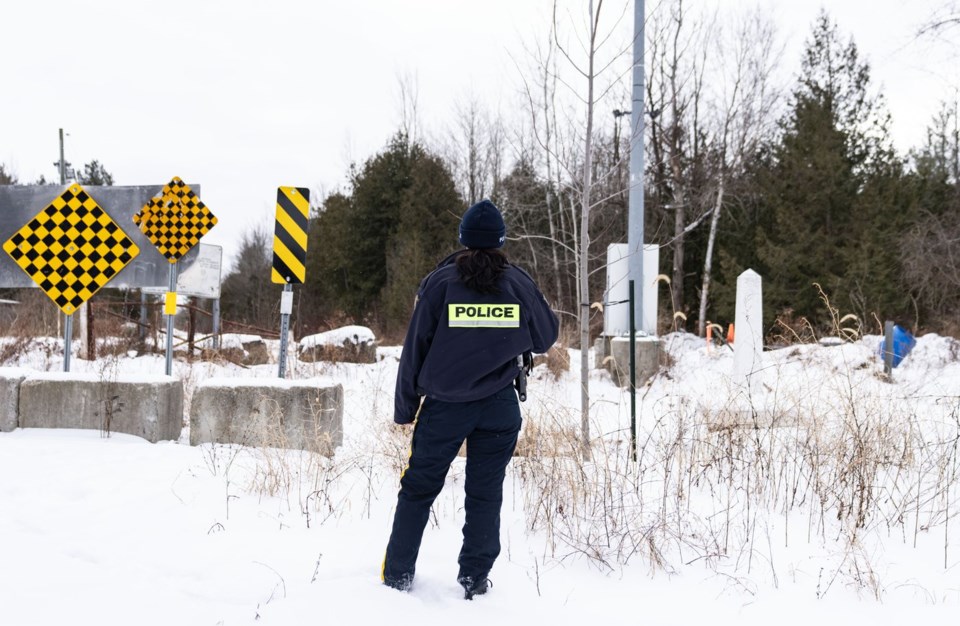MONTREAL — There has been a steady rise in the number of people seeking asylum at a major border crossing south of Montreal, border officials said Tuesday amid concerns that Trump administration policies could drive another massive influx of migrants to Canada.
The rise in would-be refugees at the St-Bernard-de-Lacolle crossing coincides with the looming expiration of the temporary status of hundreds of thousands of migrants in the United States.
Data from Canada Border Services Agency shows the number of asylum claims at the St-Bernard-de-Lacolle point of entry has increased since the start of the year, with a high of 1,356 applications in March and 557 claims as of Saturday for April.
Frantz André, spokesman for a Montreal-based group that helps undocumented migrants with asylum cases, says there has been a rise in would-be refugees coming to Canada since the election of U.S. President Donald Trump in November. Many of the claimants at the Quebec border crossing are Haitians fleeing the U.S. before their status is removed, he said.
"There's so many people that have been deported since Donald Trump has been in office, you know they're just scared," André said, adding that people have started receiving letters from U.S. authorities saying their status has been revoked.
"So, as soon as they get the letter, they're looking for ways to get out of the states."
However, the number of claims so far in 2025 is down compared to the same period in 2024, when airports were a key entry point for would-be refugees. Border agents have processed 5,246 asylum applications as of April 6, compared to 11,118 on the same date last year — a reduction of approximately 53 per cent.
But there are fears that a crackdown on immigration in the U.S. will lead to a new influx of people heading north. During the first Trump administration, strict policies against Haitian migrants led to thousands of them travelling to Canada, mostly to Quebec.
U.S. Homeland Security said last month it was revoking the temporary status of 532,000 people from Cuba, Haiti, Nicaragua and Venezuela who flew to the country at their own expense with a financial sponsor. It ends April 24.
The Trump administration has also announced an end to Temporary Protected Status for 600,000 Venezuelans and about 500,000 Haitians — set to expire in August — though a federal judge temporarily put that on hold.
André doesn't believe they'll be waiting until August to make their break.
"We've seen already what's happening, I don't think they're going to wait … because currently ICE (Immigration and Customs Enforcement) is going to workplaces, to churches, going on the street," André said.
"They intercept you and, if you are one of those, you're gone."
The Canada-US Safe Third Country Agreement requires people to claim asylum in the first country they arrive to — meaning they can't travel to the U.S., for example, and then claim asylum in Canada. There are exceptions: would-be refugees can cross the border and claim asylum in Canada if they have a family member in the country. Other exceptions include non-accompanied minors, or anyone who crosses illegally and hides out in Canada for two weeks before they claim asylum.
Over the weekend, the RCMP said nine Haitian migrants were caught walking into Franklin, Que., from Churubusco, N.Y. Despite the rise in asylum claims, police said they have not recorded a spike in illegal border crossings.
Cpl. Érique Gasse said that on Saturday a man and a woman — both Canadian citizens of Haitian origin — were arrested for violating the Immigration and Refugee Protection Act. Police found four men at 5:30 a.m. Monday as they emerged from the forest and five others — two women and three children — four hours later after a search including police dogs and a helicopter.
The rise in asylum claims drew reaction on the federal campaign trail Tuesday, with Liberal Leader Mark Carney saying it's not acceptable that people leave the U.S. to claim asylum in Canada. That position is in stark contrast to that of his predecessor, Justin Trudeau.
"Under this (safe third country) accord, we can send them back to the United States and for me this is appropriate," Carney told reporters in Delta, B.C. "The situation has changed in the United States, the possibility of a wave of asylum seekers exists now, and Canada and the United States must work in close collaboration to manage this situation."
Conservative Leader Pierre Poilievre, speaking to reporters in Edmonton, blamed the Liberals for what he called a "broken" immigration system. "Obviously, if someone is a true refugee who is truly endangered abroad and they come in under the proper rules, then they should be allowed to stay," Polievre said.
"But if they're a fraudster, they will have to go."
This report by The Canadian Press was first published April 8, 2025.
— With files from The Associated Press, Émilie Bergeron and Sarah Ritchie in Ottawa and Dylan Robertson in Delta, B.C.
Sidhartha Banerjee, The Canadian Press


